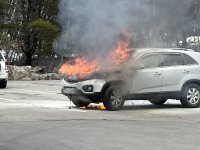Two of us tried to knock this down with fire extinguishers today, before flames started showing through the hood. Without popping the hood it was a futile effort, and I wasn’t about to try that.
Finally the store clerk who had called the FD told us they said to leave it.
Amazingly, as I was taking this picture people were still pulling in and trying to get gas.

Finally the store clerk who had called the FD told us they said to leave it.
Amazingly, as I was taking this picture people were still pulling in and trying to get gas.




